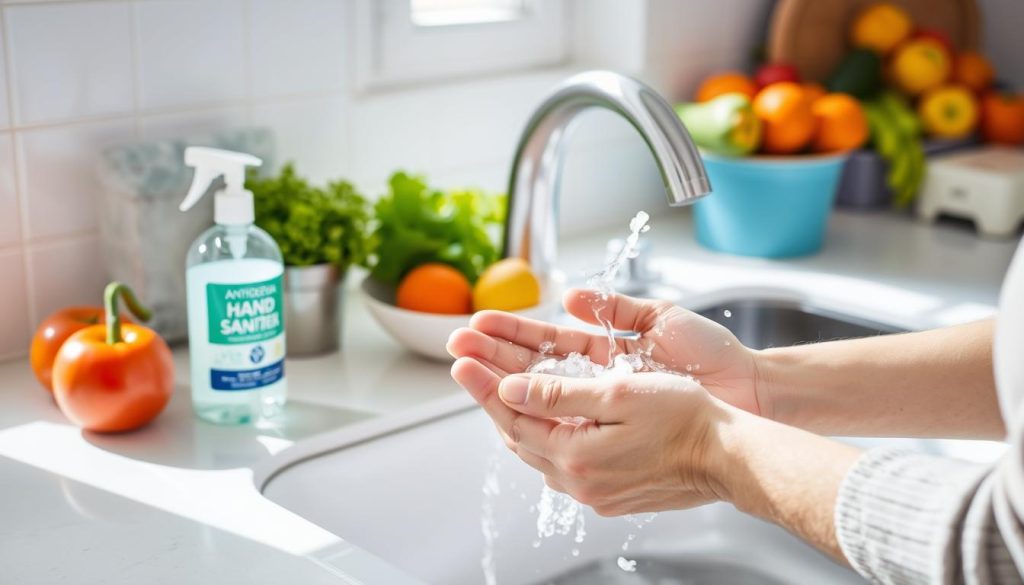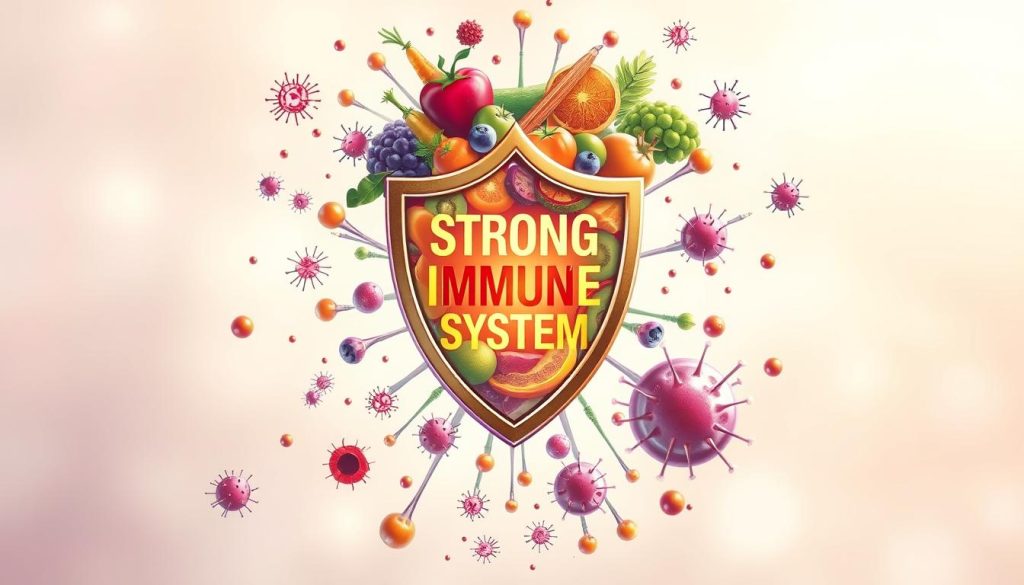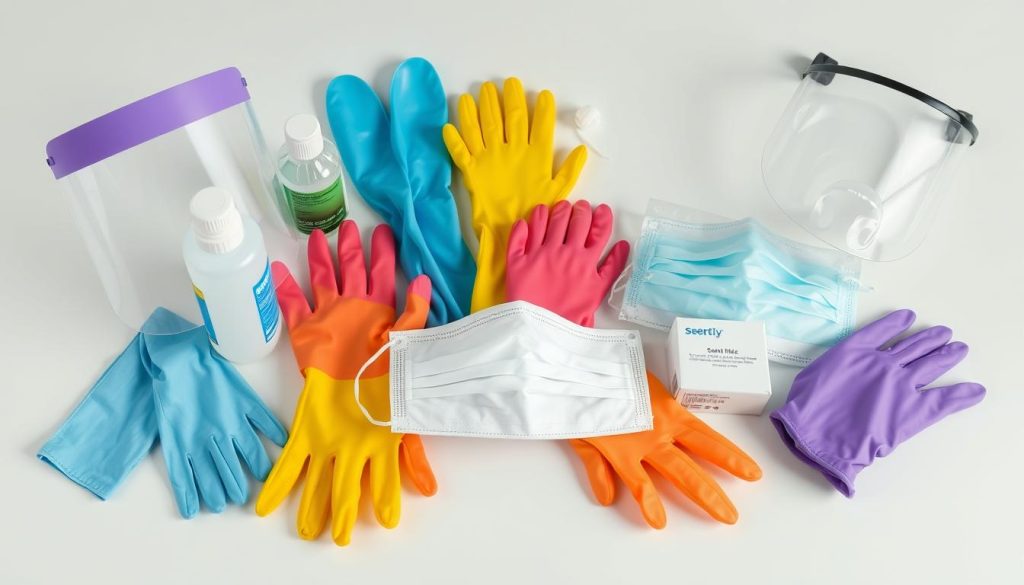Every year, many people face the problem of a stomach bug. They look for ways to prevent stomach bug symptoms from ruining their lives. Gastroenteritis, or the stomach flu, brings discomfort and trouble, making post-exposure stomach bug prevention very important for staying healthy.
This guide will help you stay safe after being exposed to a stomach bug. It offers practical tips on hygiene and diet to protect you from this common illness.
Knowing how to avoid getting sick after being exposed to germs is key for your health and safety. This guide will give you the tools to handle the risks of these bugs. By following these steps, you can keep your health safe during the post-exposure period.
Understanding the Risks of Stomach Bug Post-Exposure
After being exposed to a stomach bug, it’s key to know how it can spread and how to stop it. Learning about how it spreads and its symptoms helps in managing risks. This knowledge helps in avoiding a full-blown infection.
Common Ways Stomach Bugs Spread
Stomach bugs mainly spread through touching an infected person or eating contaminated food or water. This part explains how it spreads to stress the need for careful precautions:
- Person-to-person contact: Sharing utensils or touching surfaces that have been in contact with an infected individual can rapidly spread the infection.
- Consumption of contaminated food or water: Ingesting food or water that has not been properly handled or treated can harbor pathogens responsible for stomach bugs.
- Contact with contaminated surfaces: Touching surfaces that have been infected and then touching your mouth or face can facilitate the entry of viruses or bacteria.
Recognizing the Symptoms of a Stomach Bug
Spotting symptoms early is key to preventing stomach bugs. Common signs include:
- Nausea and vomiting: These are often the first signs that one has contracted a stomach bug.
- Diarrhea: Frequent, loose stools are a hallmark of most stomach bugs.
- Stomach cramps and pain: Discomfort in the abdominal area is a frequent symptom of a gastrointestinal infection.
- Fever: Some stomach bugs may also manifest with a fever, indicating an immune response to the infection.
By watching for these symptoms, people can act fast to manage their health. This helps in avoiding severe effects and quick recovery.
Immediate Steps to Take After Possible Exposure
It’s important to act fast if you think you’ve been exposed to a stomach bug. This can help you avoid getting sick from a stomach bug and stay healthy. Here are some steps to help you stay well.

- Stay away from others if you think you’ve caught a stomach bug. This stops the bug from spreading.
- Watch your body for signs like nausea, vomiting, diarrhea, and stomach pain.
- Wash your hands often with soap and water for at least 20 seconds. This is key to staying clean.
Also, clean your home often, focusing on places like bathrooms and kitchens. Germs can grow fast in these areas.
| Preventive Action | Details |
|---|---|
| Isolation | Keep away from family to stop the bug from spreading. |
| Symptom Monitoring | Keep track of any symptoms and how bad they are. Note any changes in your health. |
| Hygiene Improvement | Improve your cleaning habits, like washing hands before eating and after using the bathroom. |
| Surface Disinfection | Clean often-touched areas with disinfectants to kill germs. |
By acting quickly after exposure, you can lower your risk of getting sick. You’ll also help keep your surroundings healthier for everyone.
Strategies for Stomach Bug Prevention
To keep yourself safe from a stomach bug, it’s important to follow some key steps. This part will talk about how to avoid getting sick after being exposed. It will also cover what to eat to keep your immune system strong.
Hygiene Practices to Prevent Illness
Good hygiene is the best way to stop stomach bugs. Washing your hands well with soap and water for 20 seconds can really help. If you can’t wash your hands, use hand sanitizer. Make sure it has at least 60% alcohol to work best.
Dietary Considerations for Enhanced Immunity
Eating the right foods is key to a strong immune system. This helps you fight off stomach bugs. Eating lots of fruits, vegetables, and whole grains is good. They are full of vitamins, minerals, and antioxidants that help your gut and immune system.
| Food Type | Benefits | Examples |
|---|---|---|
| Fruits | High in vitamins and antioxidants | Oranges, berries, bananas |
| Vegetables | Rich in fiber and essential nutrients | Spinach, kale, broccoli |
| Probiotics | Support gut flora and digestion | Yogurt, kefir, sauerkraut |
| Whole Grains | Provide necessary dietary fiber | Oatmeal, quinoa, brown rice |
Maintaining a Clean Environment to Avoid Contamination
To keep stomach bugs away, it’s key to keep your space clean. This means washing surfaces often and keeping shared areas spotless. Doing this lowers the chance of getting sick.
Disinfecting High-Touch Surfaces
Places like door handles and phones are where germs spread easily. Cleaning these spots often is a must. Use cleaners that the EPA says work well to make sure they’re germ-free.
Importance of Sanitization in Shared Spaces
Kitchens and bathrooms are places where germs can grow if not cleaned right. Use strong cleaners and clean often to keep these areas safe from sickness.
| Area | Recommended Disinfectant | Frequency of Cleaning |
|---|---|---|
| Kitchen Counters | Bleach-based cleaner | Daily |
| Bathroom Surfaces | Hydrogen peroxide solution | Twice a week |
| Remote Controls | Alcohol wipes | After each use |
How to Avoid Stomach Bug After Exposure
Knowing how to avoid getting sick from stomach bug after exposure is key to staying healthy. This section covers the best ways to prevent getting sick after being exposed to a stomach bug. It focuses on post-exposure stomach bug prevention.
Spotting early symptoms is very important. Taking action quickly can help prevent worse health problems. Learning about early symptoms, like those on this page, is a big step in taking care of your health.
| Action | Benefit |
|---|---|
| Immediate handwashing | Reduces the number of pathogens |
| Using hand sanitizers | Provides a quick disinfecting solution when soap and water are not available |
| Avoiding close contact with others | Minimizes the spread of the bug to others |
| Consultation with a healthcare provider | Ensures appropriate measures are taken, including necessary medications or treatments |
To really avoid getting sick from stomach bug, keep your space clean and practice good hygiene. Make sure to disinfect high-risk areas like bathrooms and kitchens. These steps not only help prevent stomach bugs but also promote a healthy lifestyle.
Being careful and using these prevention tips can lower the chance of getting or spreading the stomach bug. Learning about personal and environmental hygiene is important. It helps protect not just your health but also the health of others around you.
Boosting Your Immune System Effectively
To keep your health safe, it’s key to boost your immune system after being exposed to stomach bugs. Using science-backed strategies can help prevent stomach bugs and keep you healthy after exposure.
Nutritional Supplements That Help
Adding certain nutritional supplements to your diet can strengthen your body’s defenses. Vitamins like Vitamin C, Vitamin D, and Zinc are vital for immune support. Probiotics, found in yogurt and supplements, also help keep your gut healthy, fighting off pathogens.
- Vitamin C – speeds up the creation of white blood cells to fight infections
- Vitamin D – enhances the pathogen-fighting effects of monocytes and macrophages
- Zinc – critical for immune cell function and signaling
- Probiotics – support gut health, where a significant portion of the immune system is located
Physical Activity’s Role in Immunity
Regular exercise is also key for a strong immune system. It boosts circulation, helps immune cells move, and lowers stress. Stress can weaken your immune system.
Doing moderate exercise like brisk walking, swimming, or cycling for 150 minutes a week can greatly benefit your immune system.

By using vitamins and staying active, you give your body the best tools for fighting off sickness. These steps are essential for staying healthy after being exposed to illness, keeping your body ready for any health threats.
Importance of Personal Hygiene and Handwashing
Personal hygiene, like handwashing, is key to stopping illnesses like the stomach bug. This part explains why handwashing is so important. It shows how it’s a strong way to prevent stomach bugs.
Handwashing can greatly cut down on the spread of stomach bug pathogens. By washing hands well, we can stop infections from spreading. This helps prevent sickness from person to person and from surfaces to people.
- Use warm water and soap to lather your hands.
- Scrub every part of both hands, including the back, between the fingers, and under the nails, for at least 20 seconds.
- Rinse thoroughly under running water.
- Dry hands with a clean towel or air dryer.
Many health groups say handwashing is a top way to fight off infectious diseases.
| Component | Reason | Effectiveness |
|---|---|---|
| Soap and Water | Removes germs and dirt from skin | High |
| Hand Sanitizer | Useful when soap and water are unavailable | Moderate to high depending on alcohol content |
| Proper Technique | Ensures all areas are cleaned | High |
| Duration (20 seconds minimum) | Ensures sustained friction and coverage | High |
Adding these habits to your daily life helps prevent stomach bugs. It also boosts overall health and makes our community stronger.
Utilizing Protective Gear and Practices
When we’re in places where stomach bugs can spread easily, it’s key to use prevention methods for stomach bug. Wearing the right protective gear is very important. This is true after being near germs that could make us sick.
When and How to Use Protective Equipment
Masks and gloves are vital in stopping the spread of stomach bugs. Masks block respiratory droplets that carry infections. Gloves help avoid touching things that might be dirty. Wear these in public and at home if there’s a chance of getting sick.
Best Practices for Public Spaces and Gatherings
Following public health advice is key to stop stomach bugs from spreading. Keep clean and stay far from others in crowded places. It’s safer to follow what health experts say than to guess.
For more tips on staying safe, check out this resource.
- Always wear masks properly, covering both nose and mouth.
- Use gloves, like in public transport or supermarkets.
- Throw away protective gear right to avoid spreading germs.

Stomach Bug Prevention Methods for High-Risk Individuals
People at high risk, like the elderly and those with weakened immune systems, need specialized prevention for vulnerable populations. They are more likely to get sick from stomach bugs. So, it’s important to have specific ways to keep them safe and healthy.
Special Precautions for the Elderly and Immunocompromised
The elderly and those with weakened immune systems must follow strict rules to stay safe. This includes being careful after they might have been exposed to a stomach bug. By doing these things, they can lower their risk of getting very sick.
| Prevention Strategy | Description | Specific Benefits for High-Risk Groups |
|---|---|---|
| Regular Hygiene Checks | Mandatory daily hygiene practices including handwashing and sanitizing surfaces. | Reduces the chance of virus or bacteria transmission through touch. |
| Nutritional Support | Enhance diet with vitamins and minerals known to boost immune function. | Provides the necessary nutrients to fend off infections. |
| Restricted Visitor Policy | Limits exposure by controlling the flow of visitors and monitoring signs of illness. | Helps prevent the introduction of new pathogens into their living environment. |
Using these specialized prevention steps helps keep people safe after they’ve been exposed to a stomach bug. It also makes their immune system stronger. This helps them fight off infections better.
Safe Food Preparation and Storage Techniques
It’s key to use safe food handling and storage to prevent stomach bugs and boost dietary considerations for enhanced immunity. By sticking to food safety rules, you can lower the chance of getting sick from food. This part talks about easy steps to keep your food safe every day.

How you handle food is very important in avoiding infections. Good food safety is more than just keeping things clean. It’s about a full plan for handling, storing, and cooking food right.
- Always wash your hands well with soap and water before and after touching food to help prevent stomach bugs.
- Use different cutting boards and tools for raw meats and other foods to stop germs from spreading.
- Cook foods to the right temperature to kill off bad bacteria.
- Put away cold items in the fridge right away to keep them fresh and stop bacteria from growing.
Storing food right is also key to keeping it safe and good. Below is a table with the best storage times for various foods. This helps keep your food safe and supports dietary considerations for enhanced immunity.
| Food Item | Refrigerator (40°F or below) | Freezer (0°F or below) |
|---|---|---|
| Poultry | 1-2 days | 9 months |
| Ground Meat | 1-2 days | 3-4 months |
| Steaks/Chops | 3-5 days | 4-12 months |
| Leftovers | 3-4 days | 2-6 months |
Following these storage tips keeps your food safe and good. Adding these habits to your life not only stops stomach bugs but also makes you healthier. It’s all about better dietary considerations for enhanced immunity.
Managing Stress to Keep Your Digestive System Healthy
Stress can hurt your digestive health and weaken your immune system. It’s important to understand this link. This knowledge helps in keeping your immune system strong and staying healthy after facing health threats. Reducing stress is key for both your mind and body, helping in recovery and prevention.
Stress Reduction Techniques That Work
There are many ways to reduce stress, all aiming to improve your health. Mindfulness meditation, regular exercise, and balancing work and life are effective. These activities help lower stress and boost your digestive health.
- Mindfulness meditation helps calm your mind.
- Exercise, even light, releases stress and tension.
- Keeping work and life balanced prevents burnout and stress-related health problems.
The Connection Between Mental Health and Immunity
Your mental health is key to a strong immune system. Stress can cause inflammation, weakening your immune system. This makes you more likely to get sick. Taking care of your mental health boosts your immune system and helps you recover faster.
| Mental Health Strategy | Immune System Benefit |
|---|---|
| Mindful Meditation | Reduces stress-related inflammation |
| Regular Exercise | Enhances immune surveillance |
| Healthy Social Interactions | Decreases production of stress hormones |
| Adequate Sleep | Increases immune system regeneration |
| Professional Counseling | Stabilizes behavioral responses to stress |
By managing stress, you protect your digestive health and boost your immune system. This helps you stay healthy after facing health risks. It’s best to use a mix of mental and physical health strategies for the best results.
Proactive Healthcare: Regular Check-Ups and Vaccinations
Regular check-ups and vaccinations are key to proactive health measures. They help prevent post-exposure stomach bug prevention. Knowing how they protect us is very important.
The Role of Vaccines in Preventing Gastroenteritis
Vaccines are vital in fighting viral gastroenteritis. This includes rotaviruses and noroviruses. They prepare our bodies to fight these viruses before we get sick. This can greatly lower the risk of severe illness and stop it from spreading.

Scheduling Health Checks for Preventative Care
Regular health checks are essential. They help find early signs of health problems, like being more likely to get stomach bugs. These visits let doctors give advice on proactive health measures. They also make sure vaccinations are up to date, keeping us safe from many illnesses.
- Annual physical exams to assess general health.
- Updated vaccinations as per latest health guidelines.
- Discussion on dietary and hygiene habits to prevent infections.
By taking these steps, we can protect ourselves from getting sick. This shows how important it is to take preventive measures for our health.
Stay Well After Stomach Bug Exposure: Vital Rest and Recovery Tips
Getting better from a stomach bug is more than just treating symptoms. It’s about listening to your body’s needs. These recovery tips for stomach bug can help you bounce back faster and avoid more problems.
The Importance of Adequate Sleep
Sleep is key to recovering from any illness, including stomach bugs. When you stay well after stomach bug exposure, getting enough sleep is essential. Sleep helps your body heal and your immune system fight off any remaining infection.
Knowing When to Seek Medical Assistance
While mild stomach bugs can be treated at home, some symptoms need a doctor’s help. If you have severe dehydration, bloody stools, or extreme pain, get medical help right away.
Here are some symptoms that mean you should see a healthcare provider:
| Symptom | Description | Action Needed |
|---|---|---|
| Dehydration | Dry mouth, extreme thirst, infrequent urination | Seek immediate medical help |
| Bloody Stools | Presence of blood in vomit or stool | Visit healthcare professional |
| Severe Abdominal Pain | Persistent or sharp pain not relieved by basic remedies | Consult a doctor promptly |
Avoid Gastroenteritis After Exposure: The Role of Probiotics and Prebiotics
Probiotics and prebiotics are key in fighting off stomach bugs. Probiotics are live good bacteria that keep the gut healthy. Prebiotics feed these good bacteria, helping them grow strong.
This team helps the body fight off bad bacteria. It’s a strong way to prevent stomach bugs. Eating foods rich in probiotics and prebiotics can help your gut stay healthy.
Studies show that probiotics and prebiotics are very helpful. They can make your digestive system stronger. This makes it harder for stomach bugs to take hold.
Experts agree that these nutrients are good for your gut. But, always talk to a doctor before starting them. This is true, even if you’ve been exposed to bad bacteria.
Probiotics and prebiotics do more than just help with digestion. They also boost your immune system. A healthy gut means a stronger body.
Using probiotics and prebiotics is part of a bigger plan. It includes staying clean, eating well, and seeing a doctor. Together, they help keep you safe from stomach bugs.
FAQ
Q: How can I prevent a stomach bug after exposure?
A: To avoid a stomach bug, wash your hands often. Don’t share food or utensils. Clean surfaces well and eat nutritious foods to boost your immune system. Using probiotics and prebiotics can also help your gut health.
Q: What are common ways that stomach bugs spread?
A: Stomach bugs spread through contaminated food or water. They also spread through touching surfaces and then your face. Contact with infected animals is another way.
Q: What should I do immediately after possible exposure to a stomach bug?
A: If you think you’ve been exposed, stay away from others. Watch for symptoms and wash your hands a lot. Use hand sanitizer too.
Q: What dietary considerations can help prevent a stomach bug?
A: Eat foods full of vitamins and minerals to boost your immunity. Yogurt is good for your gut. Drink plenty of water. Make sure to handle food safely to avoid getting sick.
Q: How can I maintain a clean environment to help prevent the spread of stomach bugs?
A: Clean high-touch areas like doorknobs and countertops often. Use cleaners approved by the EPA. Keep bathrooms and kitchens clean and shared spaces tidy.
Q: How does maintaining personal hygiene help to avoid gastroenteritis after exposure?
A: Keeping clean, like washing your hands well, removes germs. This is a key way to stop getting sick.
Q: What protective gear should I use to prevent a stomach bug after exposure?
A: Use gloves when cleaning areas that might be contaminated. Wear a mask if you’re sick and need to be around others to stop spreading the bug.
Q: Are there special stomach bug prevention measures for high-risk individuals?
A: Yes, people at high risk, like the elderly, should avoid sick people. Follow strict hygiene rules. Talk to a doctor for advice.
Q: Can stress influence my risk of getting a stomach bug after exposure?
A: Yes, stress can weaken your immune system. Try to reduce stress with mindfulness, exercise, and enough sleep. This helps your immune and digestive health.
Q: What is the role of vaccines in preventing gastroenteritis?
A: Vaccines, like the rotavirus vaccine, can prevent some stomach bugs. For other causes, no vaccine exists. But, staying up to date on vaccines helps your immune system.
Q: How important is rest if I’ve been exposed to a stomach bug?
A: Rest and sleep are key for your immune system. If exposed, make sure to get enough sleep to fight off infection.
Q: Can probiotics and prebiotics help avoid gastroenteritis after exposure?
A: Yes, probiotics and prebiotics support a healthy gut. This helps fight off pathogens, including those that cause stomach bugs. Adding them to your diet can boost your resistance.


















